Spring is springing, the cherry trees are in blossom, and Earth Day and Arbor Day are just around the corner! If you’re looking to dive into some reading about the environment, nature, and climate change, the University Library has great fiction and non-fiction for you to check out.
Fiction
1. Kim Stanley Robinson – The Ministry for the Future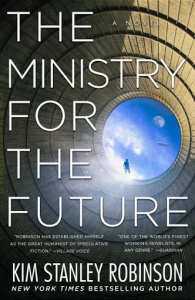
Kim Stanley Robinson has won dozens of awards in his long career as a sci-fi author, and it’s easy to see why when you pick up his 2020 novel The Ministry for the Future. This story follows activists, diplomats, and ordinary people over the course of the 21st century as they fight to prevent climate change. Robinson skillfully mixes hard science with likable, compelling characters, and balances realism with optimism, as he imagines our path to a future society where humans live in harmony with the environment.
The Ministry for the Future is available as an ebook from the University Library.
(Many of Robinson’s books deal with human society and our relationship to the environment – if you enjoy this one, be sure to check out his Mars trilogy, New York 2140, or others of his books.)
2. Octavia Butler – Parable of the Sower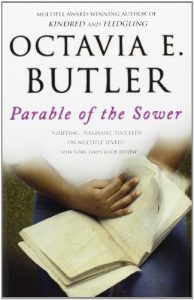
Octavia Butler was a titan of sci-fi who won many awards for her brilliant explorations of race and gender. In her 1993 dystopian novel, Parable of the Sower, the United States of the near future has been ravaged by climate change, unchecked corporate power, and religious fundamentalism. When teenager Lauren sees her home destroyed by bandits, she is forced to survive the harsh realities of the road and begins to develop a new religion, Earthseed, as she gathers a community around her.
Parable of the Sower, and its sequel, Parable of the Talents, are available from the University Library.
3. Paolo Bacigalupi – The Windup Girl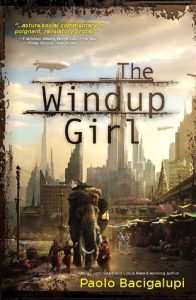
Paolo Bacigalupi’s 2009 debut novel imagines a 23rd-century Thailand struggling with rising sea levels, genetically engineered plagues, and neocolonial corporations. The novel follows a sprawling cast of characters through this dystopia, including Emiko, a genetically modified indentured servant seeking freedom and community; Anderson, an economic hitman for an American corporation; and Jaidee, a captain in the Thai Environment Ministry who aims to protect his country from foreign exploitation. The Windup Girl won many awards for its contributions to the climate fiction and “biopunk” genres.
The Windup Girl is available from the University Library.
4. Jenny Offill – Weather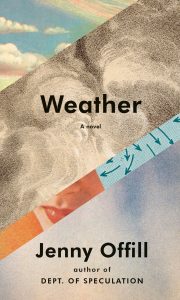
Jenny Offill’s 2020 novel follows a college librarian, Lizzie, as she contemplates climate change and her relationship to the environment, while navigating the daily dramas and crises of family life. Rather than imagining future dystopias or utopias of climate crisis, Offill skillfully grounds us in the present with wry humor and thought-provoking observations.
Weather is available from the University Library.
5. Richard Powers – The Overstory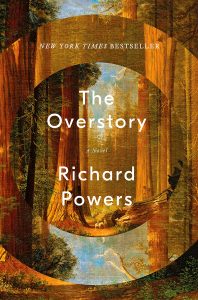
In Powers’ 2018 novel, a group of characters from diverse walks of life come together as activists to fight against deforestation. This Pulitzer Prize-winner is a beautiful exploration of humanity’s connection to and need for forests.
The Overstory is available as an ebook from the University Library.
Non-Fiction
1. Robin Wall Kimmerer – Braiding Sweetgrass: Indigenous Wisdom, Scientific Knowledge, and the Teachings of Plants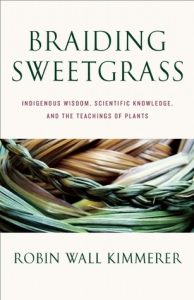
As a professor at SUNY’s College of Environmental Science and Forestry, and a member of the Citizen Potawatomi Nation, Robin Wall Kimmerer brings a unique perspective to this 2013 book about the relationships between humans, plants, and the land, blending indigenous and scientific knowledge.
Braiding Sweetgrass is available as an ebook from the University Library.
2. Amitav Ghosh – The Great Derangement: Climate Change and the Unthinkable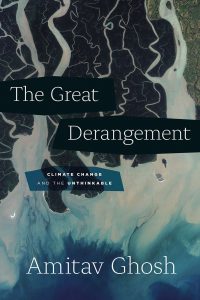
Indian writer Amitav Ghosh adapted a series of lectures on climate change into this 2016 work of non-fiction. Ghosh addresses our culture’s failure to truly grapple with climate change in literature, and the ways that colonialism drives the current crisis.
The Great Derangement is available from the University Library.
3. Carolyn Finney – Black Faces, White Spaces: Reimagining the Relationship of African Americans to the Great Outdoors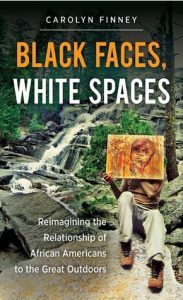
This 2014 study examines the history of American racism to explain why African Americans are underrepresented in environmentalism and outdoor pastimes, and to challenge the idea of the outdoors as a white space.
Black Faces, White Spaces is available as an ebook from the University Library.
4. Elizabeth Kolbert – The Sixth Extinction: An Unnatural History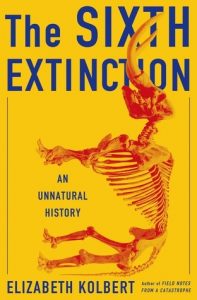
In this 2014 book, journalist and author Elizabeth Kolbert documents the history of mass extinctions past and present as she argues that we are currently in the midst of a man-made mass extinction, affecting species and biomes all over the world. She translates peer-reviewed science and interviews with experts into clear, concise prose to paint a picture of this chilling crisis.
The Sixth Extinction is available from the University Library.
5. George Monbiot – Feral: Rewilding the Land, Sea, and Human Life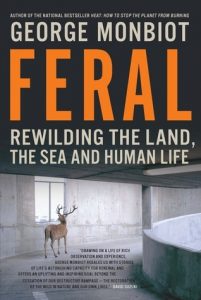
George Monbiot is a British writer, journalist, and activist whose 2013 book explores the concept of rewilding and informs us of projects to rewild ecosystems around the world. He blends lyrical nature writing with thoughtful scientific, social, and historical assessments of rewilding efforts, helping the reader to imagine what a wilder world might look like.
Feral is available from the University Library.
Written by: Tali
Posted by: Maurissa

